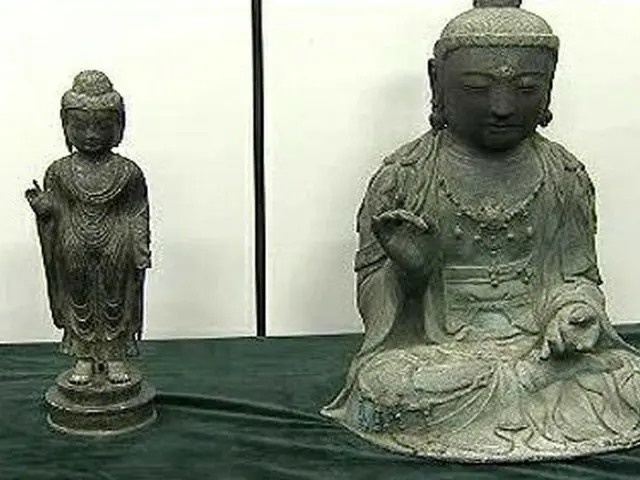Even now, after many years, the statue has not been returned. The local Tsushima island is calling for its return as soon as possible, and last month the Tsushima City Council submitted a petition calling on the Japanese government to lobby the Korean government for its early return.
The bill was passed and submitted to the Ministry of Foreign Affairs. However, in the general election on April 10, the ruling People Power Party, which supports President Yoon Seok-yeol, who has been working to improve relations with Japan, suffered a major defeat.
"There are concerns in the region that the return of the statue may be getting further away," he said. The statue of Kannon Bodhisattva, a designated tangible cultural property of Nagasaki Prefecture, was in the possession of Kannonji Temple in 2012.
In October, it was stolen by a Korean thief group and brought to South Korea. The following year, in 2013, the thieves were arrested by the South Korean police and the statue was confiscated, but the statue was found at Buseok Temple in Seosan, central South Korea.
The temple claims that the statue was "looted by Japanese pirates during the Middle Ages." In 2016, it filed a lawsuit against the South Korean government, seeking to stop the statue from being returned to Japan.
This was a complete surprise for the Korean government, which had been moving to return the statue to Japan. In the first instance, the Korean court ruled that the statue had been taken from Japan five times since 1330, based on the contents of the records found inside the statue.
Based on records from the Goryeo History that state that pirates invaded the Seosan area, the court determined that the statue was taken from Buseoksa through plunder or other means. In 2017, the court ruled that "it can be reasonably assumed that the statue belongs to Buseoksa."
The court ordered the statue to be handed over to the temple. This ruling caused a backlash from Japan, and was one of the factors that led to the deterioration of Japan-Korea relations. After the first-instance ruling, the Korean government stated that the connection between the statue and the temple had not been sufficiently proven.
The case was appealed, and the case was heard at the Daejeon High Court in Daejeon, central Korea. In February of last year, the Daejeon High Court overturned the first-instance ruling and granted the right to claim ownership of the Kannon Temple.
The high court ruled that "it is possible to acknowledge that Usekiji Temple produced the statue in 1330, and there is also evidence that it was plundered and illegally taken away by Japanese pirates," but added, "At the time,
"It cannot be proven that the former Buseok Temple is the same religious organization as the current Buseok Temple," the court said.
The statute of limitations had expired, and the current ownership was recognized by the Kannonji Temple. The Ukeseki Temple appealed the ruling to the Supreme Court. In October last year, the Supreme Court dismissed the appeal by the Ukeseki Temple, and the ownership of the statue was recognized by the Kannonji Temple.
The Supreme Court ruled that the statue was in the temple. The Supreme Court ruled that the current Buseoksa Temple was the same as the "Seju Buseoksa Temple" that produced the statue in the 14th century, but the second trial ruled that the statue had been acquired by prescription under the Civil Code.
He also pointed out that the South Korean government needs to consider international norms when considering the return of the statue. It has been 11 years since the statue was stolen, and this, along with the former forced labor lawsuit issue, is one of the factors that has worsened Japan-South Korea relations.
It was thought that this issue, which had been the cause of the dispute, would finally be resolved and the process of returning the statue to Japan would begin, but even now, six months after the ruling, the statue has still not been returned.
The temple's former chief priest, Setsutaka Tanaka, told the newspaper, "We haven't heard anything from anywhere. The Korean government won't return the stolen property. The Japanese government doesn't seem interested in taking it back, either."
On April 27, the government passed a resolution calling on the Japanese government to lobby South Korea for the early return of the islands, and sent it to the Ministry of Foreign Affairs and other organizations. At a press conference on April 26, Foreign Minister Yoko Kamikawa said, "We are continuing to communicate with the South Korean government.
South Korea will decide on the return procedures in accordance with relevant laws and regulations, and will continue to lobby for their early return."
The ruling party that supports the Yoon administration, the People Power Party, suffered a major defeat in the April 10 South Korean general election.
Meanwhile, the opposition parties that criticized the Yoon administration's policy toward Japan made great strides. According to the Yomiuri Shimbun, Tatsuma Murase, head of the Kannonji temple's congregation, told the newspaper, "I hope the ruling party loses and the return doesn't take too long.
” He expressed concern.
2024/05/01 11:17 KST
Copyrights(C)wowkorea.jp 5

